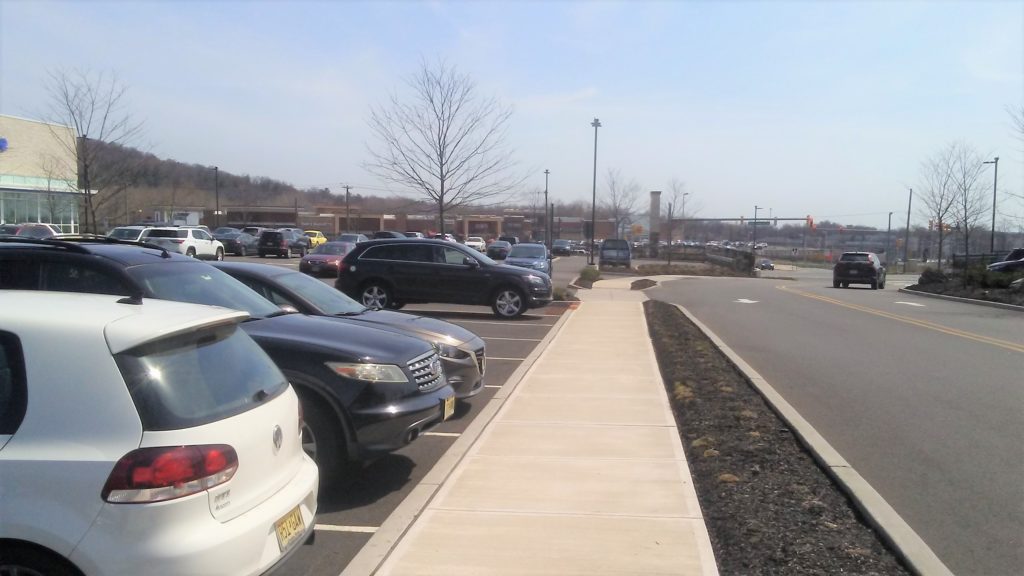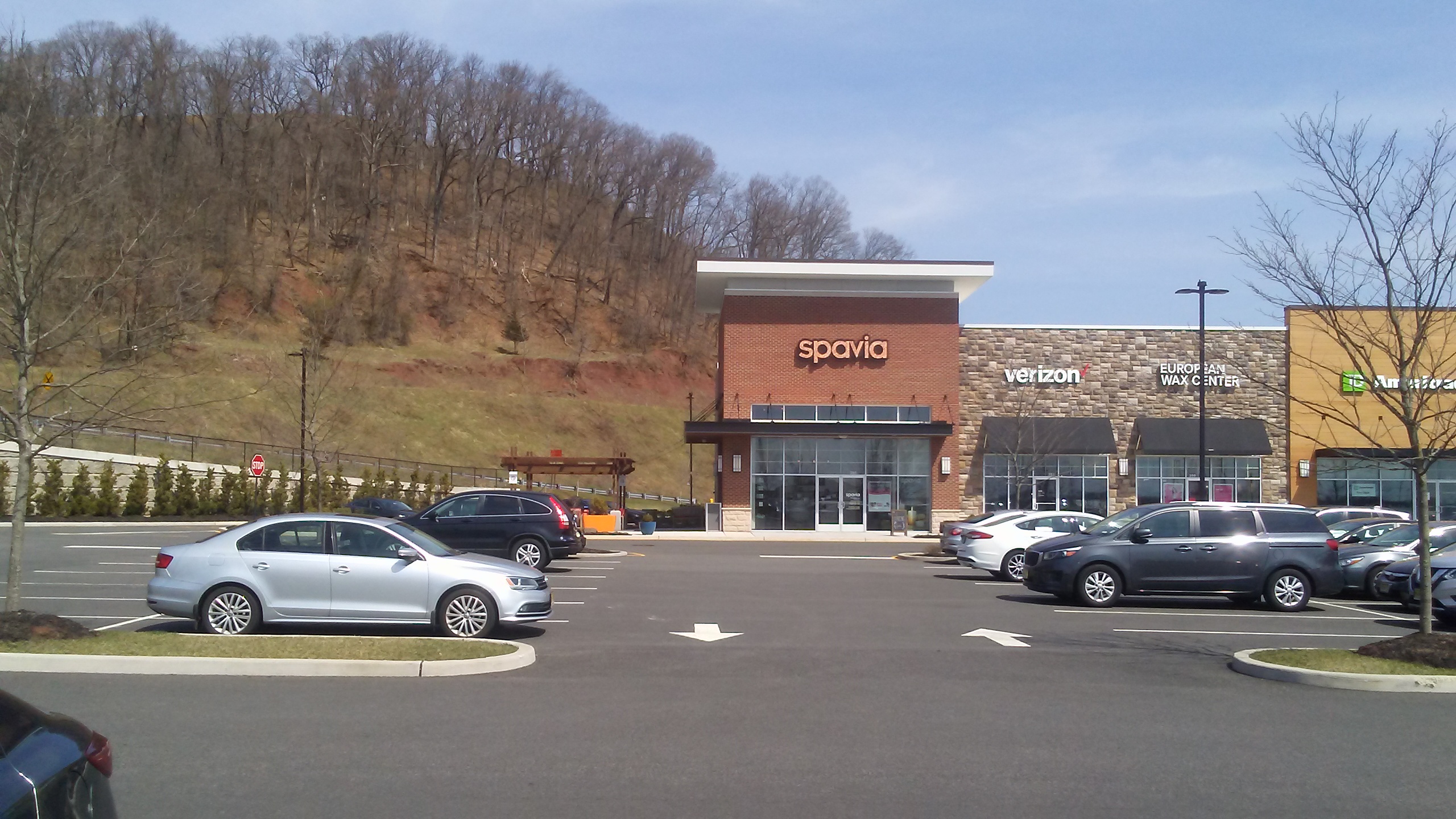How Hayes Versus Moench Teases the Zeitgeist of Bridgewater Twp.
Listen to audio version of this article

Paved over with a vengeance, former farming community Bridgewater struggles now with issues of identity, affluence dislocation and spiritual disrepair - and maybe just despair, the consequence of piggybacking off of neighboring Somerville's downtown for a sense of centered-ness otherwise absent in an almost overnight riot of box store development, ramrodded residential units and the cow-milking shambles of its past existence.
"Welcome to Bridgewater" reads the sign to the town, that accompanies an on-ramp to a stretch of highway, which fast bifurcates and funnels traffic into the parking lots of the Bridgewater Mall, a sensualist's delight that occupies - like a massive and complex Close Encounters of a Third Kind movie set - the municipality's centerpiece.
Somewhere in its shadow with its Hoboken-like lane of hip little restaurants and stores, under the spires of its churches and in the humble light of murals honoring past history and favorite sons, including civil rights heavyweight Paul Robeson and Lee Van Van Cleef of The Good, the Bad, and the Ugly fame, sustaining the very corner where jazz giant Bill Evans learned to play the piano, scene of the annual St. Pat's Parade with marching bands and soldierly nuns in tow, sits rejuvenated and rejuvenating Somerville, continually linking present with the past.
Having blown up the past, no-man's land Bridgewater must now attempt to dig out of the deep-impact consequence of its rampant over-development and seersucker secularism, by either grudgingly accepting that the old stone corridor of Somerville is, in fact, simultaneously the area's flame-keeping downtown and hipster hot-spot; or bulldozing out of the remains of its own ruins and long list of aesthetic transgressions, a new downtown, to suit the particular demands of Bridgewater's, not Somerville's, taxpaying residents.
It's not all bad, Bridgewater.
In the words of the Christian Bale character in American Hustle, "Rosalyn... Rosalyn was interesting." And so, in its own way, is Bridgewater. Even if its core feels more like a Jackson Pollock painting than a community-minded zocalo, those splashes of incongruity and disjointedness, wastrel concrete and architectural weirdness add up to a character in a movie who falls off her chair at dinner and gets unwittingly trapped in a corruption plot, which she survives. The town does have its own history. It is, after all, home to the Route 22 diner and motel where a woman once lured a prominent developer's brother-in-law in an infamous case of blackmail. But more to the point, for a social media-engineered age acclimated to a lifestyle wherein people seek new ways to close one another out and off rather than coming together around shared traditions and actual experiences, Bridgewater would appear to have a huge leg up on the future.
In Somerville, pedestrians look out of sorts - and vulnerable - trying to walk and look at their phones at the same time. In Bridgewater, people can sit securely in their cubicles and - in unbothered and germaphobic solitude - safely ingest the virtual world.
[caption id="attachment_52328" align="alignnone" width="2560"] Chimney Rock environs.[/caption]
Chimney Rock environs.[/caption]
Against this backdrop now unfolds one of the more intriguing political match-ups of the 2019 primary season. Incumbent Bridgewater Mayor Dan Hayes wants to stave off Councilman Matt Moench in an all-Republican contest, intensified amid changing demographics and a countywide fight for control of the freeholder board by an incipient general election featuring Democratic School Board Member Jeff Brookner. If Bridgewater composed a 30-year history of itself, its chapters would contain the names of its myriad development projects, the dramas of its last one, Chimney Rock, now subsumed in the dramas of its next one, the Center of Excellence. There's an enduring thread among all of them. The Bridgewater Commons Mall and its attendant razzmatazz rose in 1988 on light industrial land no longer hip enough to survive a population gut flux. Chimney Rock rose on the area around an old quarry, which sat on the burial mound, which stood on the site of the murder of a Native American Indian chief. Now Center of Excellence - the latest Orwellian term of choice for shops-residential units and a high-end feeding trough to supplant the corn cribs and silos of old - looks to replace the former Sanofi-Aventis pharmaceutical complex.
For Moench, who grew up in town in the so-called mountainous region of Bridgewater, it's finally too
[caption id="attachment_46777" align="alignleft" width="300"] Moench[/caption]
Moench[/caption]
much. He's opposing Center of Excellence, apparently in hopes of corralling the NIMBY outrage of residents convinced the squashing siting of yet another massive development project will at last undo their quality of life. In the grander scheme of Bridgewater, will the latest mall-parking lot-luxury residential extravaganza (with its share, of course, of state-mandated affordable housing units) merely add another squirting explosion of paint to a mad-capped canvas already riddled with similar jaggedly disconnected moon buggy-viable corporate craters? At the very least, "Traffic is going to be a serious problem," resident Geraldine Staub said in a January TapInto piece. This is a town still dogged by the Somerville Circle, a name that amounts to Bridgewater's nefarious little way of acting like its mile-square, within-its-own-means, self-contained and livable-walkable neighbor is responsible for the area's routine bowling pin smash-ups at everybody's favorite Russian Roulette roundabout. Routinely, a transport truck trying to get around the circle topples onto its side and leaves the place jammed. The highway nexus of a town built for wheels amid new development projects burped out annually, looks like it was built at a time when the Bay City Rollers dominated the pop charts.
For his part, Hayes sees the Center of Excellence as a model of how "aging corporate campuses" from the 1970s and 1980s can be redeveloped.
Naturally, the contest got ugly quickly, with Moench already having absorbed nearly half a dozen mail
[caption id="attachment_35089" align="alignright" width="300"] Hayes[/caption]
Hayes[/caption]
pieces branding the veteran pro-lifer and notorious budget hawk a tax and spend liberal, while he and his allies dismiss Hayes as a chinchilla of big development. Hayes' allies resent Moench's sudden aversion to development as political gimmickry and last week, Somerset County GOP Chairman Al Gaburo promised a 2-1 Hayes flattening of Moench.
For all the complexity attached to a town that feels more like a horizontal Central Jersey city with a $160 million school budget, this contest boils down to a Hercules-Antaeus cage match between two candidates who genuinely don't like each other, the vision-thing generously undercut by party political in-fighting.
His hair is touched prematurely with silver, but the intellectually hyperactive Moench in his mid-thirties still has the feel of a young man in a hurry, whose sense of the clock ticking down on his drive for the end-zone probably forced his decision to give up the council seat he's sat in for 12 years to take a hail Mary shot at Mary. There's something of a Steve Fulop-Jerry Healy aura about Moench v. Hayes. It oversimplifies, of course, but the story line smacks of Machiavellian kid against people-friendly backslapper. An attorney, Moench went to Seton Hall Law School, where he had former Assemblyman Freddie Caraballo , who put him in touch with future Senator Kevin O'Toole (R-40), who gave the kid his own Miller's Crossing-inspired tutorials in New Jersey politics.
Moench looked like he was going to be a late twenty-something mayor in 2011, when he ran into Hayes, whom allies of the much younger Moench takes a little credit for having groomed off the planning board, a characterization the Hayes forces deeply resent. In any case, when they vied for the backing of the local Republican Committee eight years ago, Hayes and Moench tied on first ballot. On the second ballot, Hayes defeated Moench, who crawled back to his council seat. In the years subsequent, after having filled empty committee seats and taken out a handful of those committee members who opposed him at the outset, Moench took over the local Republican Party and won the backing of the committee to reverse the old indignity from 2011. Then Gaburo - a fierce Hayes backer - refused him the county line.
Now they are where they are.
The sprawl of the town abounds, and how meaningful it will become over the course of the next few weeks to shape that relentless creative energy into something sharper, maybe even something more human, may or may not be the province of this contest, deeply personal in nature and overlaid with the crackerjack box slogans of partisan politics on trumpet-shiny mail pieces. But there's enough intrigue at work now and enough contrast to entice in this Central Jersey rocket splash-down of a cracking political culture, where they go to the sidewalk-friendly bars in Somerville to socialize, and hit the roadsides in Bridgewater, when they don't wish to be seen.






#megalomaniacmatt
https://uploads.disquscdn.com/images/a749132f75cffdab3a049ed41b9b4fa8da2b5733cea3268802423dd24b2eeaec.jpg
#developerdan !